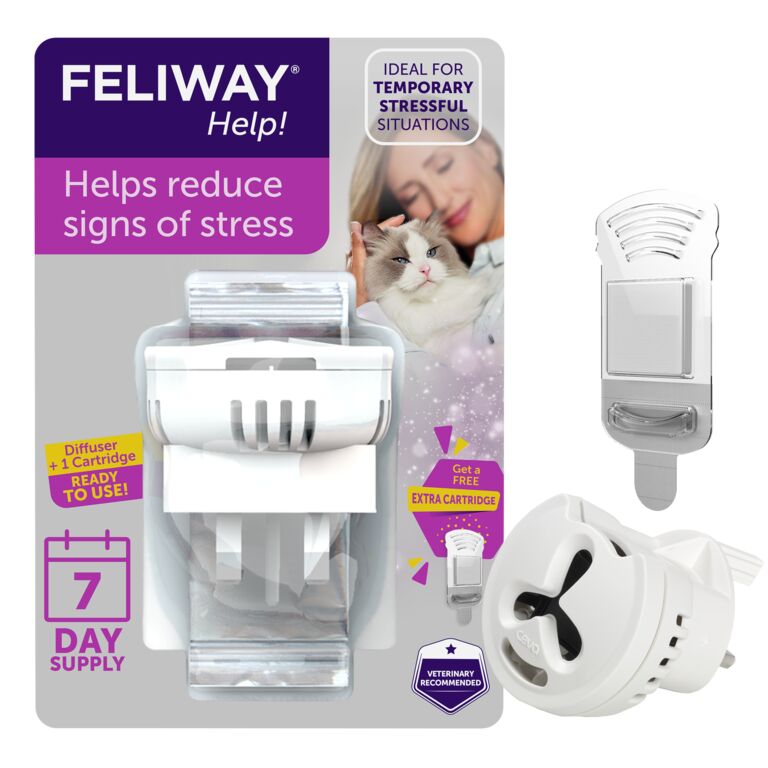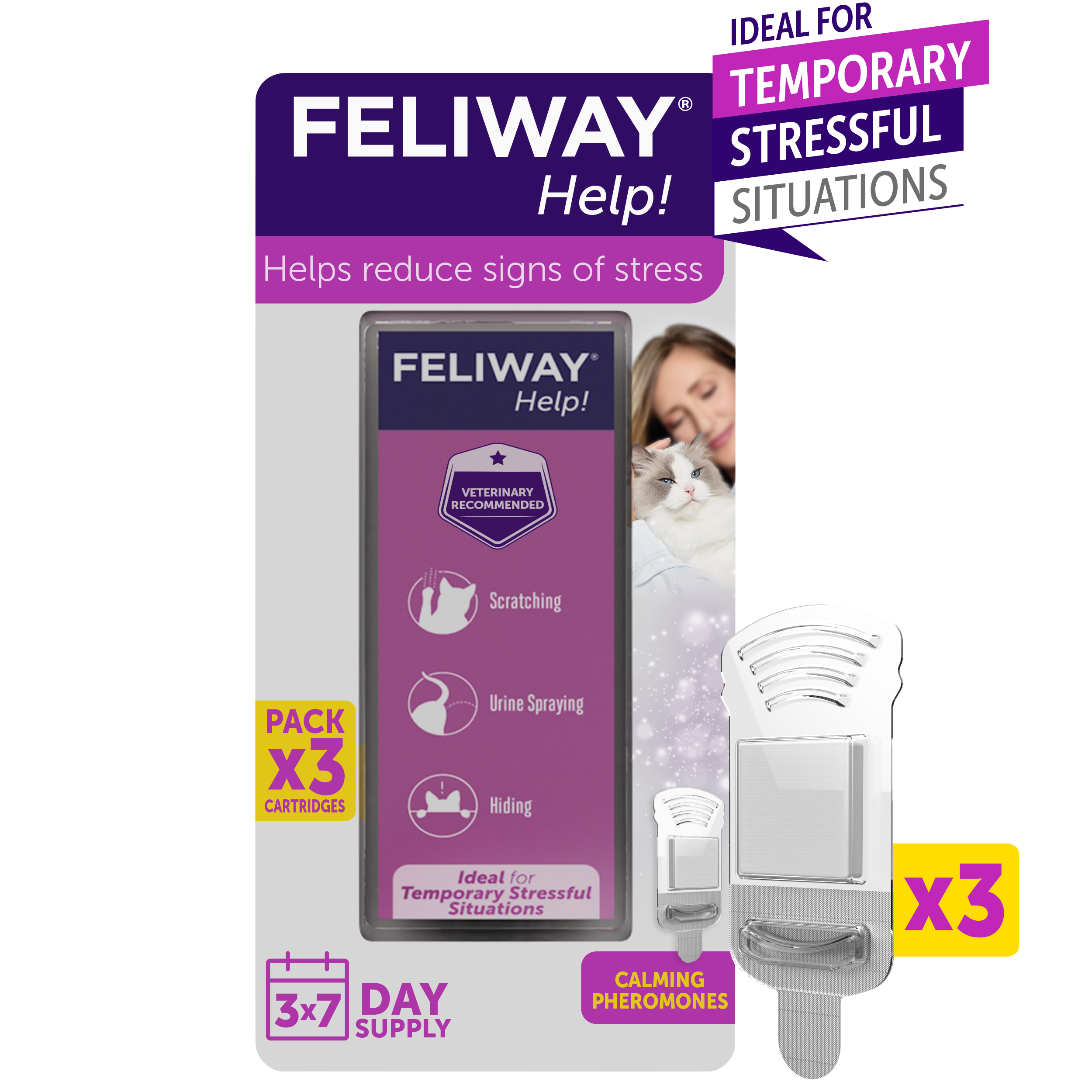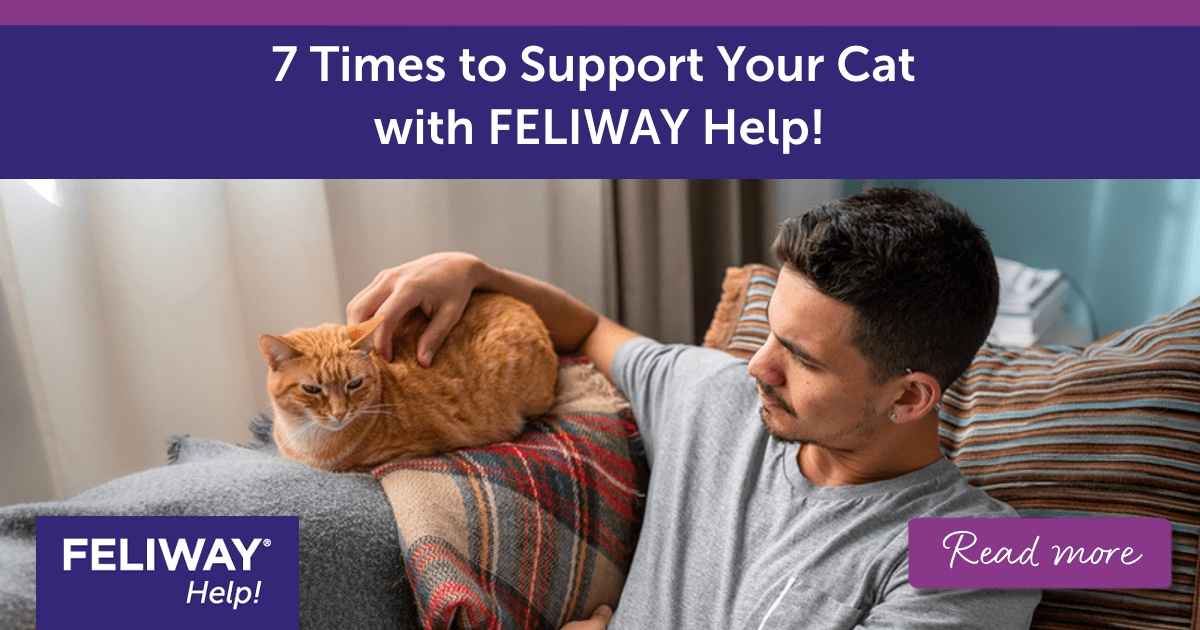
7 Times to Support your Cat with FELIWAY Help!
There are many occasions when your favourite feline friend might need extra support to help keep their anxiety at bay. As well as making sure their routine remains the same as far as possible, and that they have access to all of their resources – a comfy bed, food, water, litter trays, hiding places etc. – sometimes you may need that little extra Help!
FELIWAY Help! provides calming feline pheromones over a seven-day period and is a great option to support cats during temporary stressful situations. Plus with every purchase, you can claim another FREE refill for an additional 7 days of supportive pheromones.
Signs that your cat is not comfortable with a situation
Cats may show different signs that they are not comfortable with a situation; there are both physical and behavioural signs that can indicate your cat is feeling anxious. The usual signs include urine marking, scratching and hiding. Your cat may also be pacing, trembling or shaking, or over-grooming.
Here are some common temporary situations in which FELIWAY Help! can restore some feline calm.
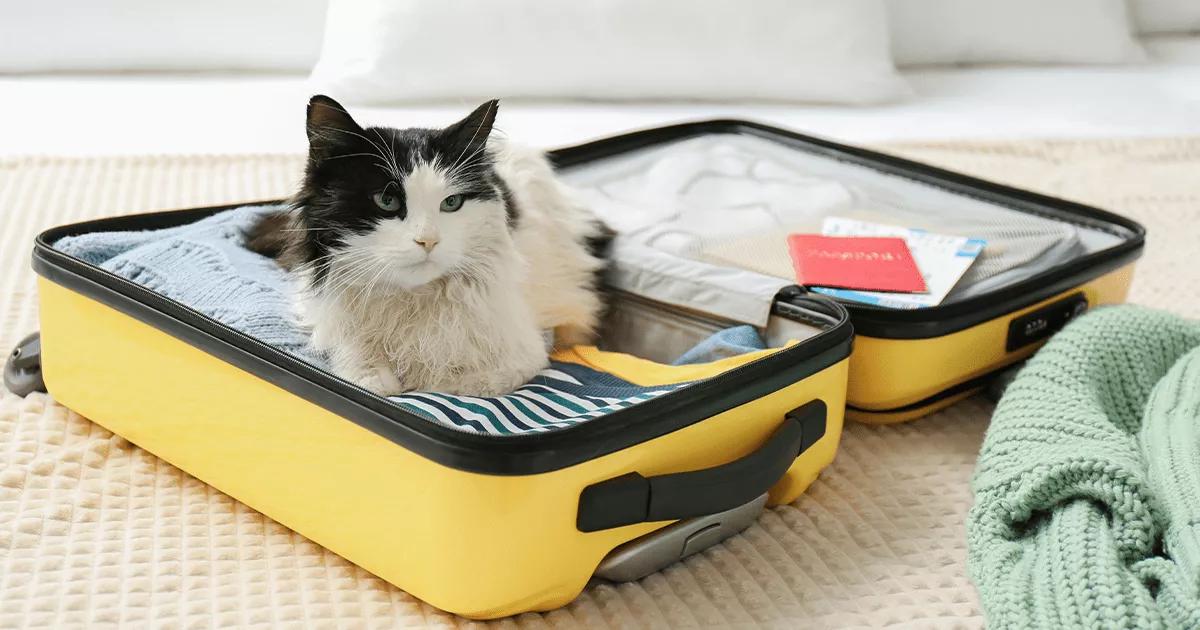
1. Weekends Away
It’s great to have a break away from your routine to visit friends or family – but that’s not the case if you’re not a cat! Cats are home-lovers that prefer a routine, and anything which disrupts this could prove a challenge for them.
Your absence may cause them stress and, in addition, their meal times may change if someone else is looking after them, or they may simply not get the same attention. Here’s how you can support your cat if you’re planning a weekend away:
- Arrange for your cat-sitter to spend time with your cat ahead of you going away.
- Encourage them to build a relationship with your cat through play, using treats as a reward. However, it’s important that your cat is never forced to interact with the sitter – allow them to meet and bond on your cat’s terms.
- Make sure they are aware of your cat's needs and routine, so they can be maintained as far as possible. This should include any medication, of course, meal times, play times and any other interactions that your cat is used to, including grooming.
- Make sure they have emergency numbers on hand, e.g. your own and the vets.
- Start to use FELIWAY Help! two days before your trip. Simply plug it into the room that your cat will spend most of their time in, and allow it to take effect. As FELIWAY Help! is effective for up to seven days, it will also help your cat adjust to your return. After all, you will probably bring home some new smells with you!
- Make sure your own preparation is calm before you leave, so that your cat does not detect any signs of excitement or stress from you that may make them feel anxious.
2. Staying Home Alone
Some cats can cope quite well for one or two nights at home alone without a cat-sitter. If you are confident that your kitty will be happy with just their own company for a short period of time, it’s essential that you plan ahead.
- Plug FELIWAY Help! into the room where your cat will spend most of its time, two days before you leave. The diffuser covers an area of up to 50m² (approximately a two-bedroom house).
- Leave enough food and water for the period of time you’re away – and a little extra just in case you get delayed.
- Check that all of their climbing and hiding spaces are accessible and not blocked.
- Leave their favourite toys out for them to play with, but avoid anything with string or loose parts that should only be used when supervised.
- Make sure their litter trays are clean and in their favourite position. Remember to leave an extra one on hand in case of a delay.
- Close the doors to any rooms they should not have access to.
- Consider whether your cat will benefit from some noise within the house while you are not there. For example, you could leave the radio on, or play some cat music which is known to have a soothing effect on our feline friends.
- Always leave a key with a neighbour in case you are delayed, so that they can check that your cat’s resources are topped up.
- Cater for all seasons – does your cat have a cool place to go to if the weather is hot? Or alternatively, make sure you leave the heating on if temperatures are dropping.
- Check them carefully for any signs of illness or injury in the days before you leave.
- Leave them with plenty of opportunity for play – such as climbing spots for physical activity and toys for mental stimulation.
- If you are using an automated feeder/food dispenser, make sure that your cat is comfortable using it before you go away for the weekend. These can be a good way to keep food fresh.
- Make sure your cat can't knock over the water bowls you have left for them. Consider multiple bowls to ensure your cat always has adequate access to water.
- You can always keep an eye on them by installing a cat camera in your home, so that you can see what your cat is up to and whether anything is going wrong.
- If you are not happy leaving your cat at home, and there is no suitable cat-sitter available, consider a cattery. Always visit the establishment, check that it’s licensed, how the cats are housed and that they have stress-reducing measures in place (such as limited views of other cats). Will the cattery be home-from-home for your cat, with plenty of hiding places and scratching opportunities?
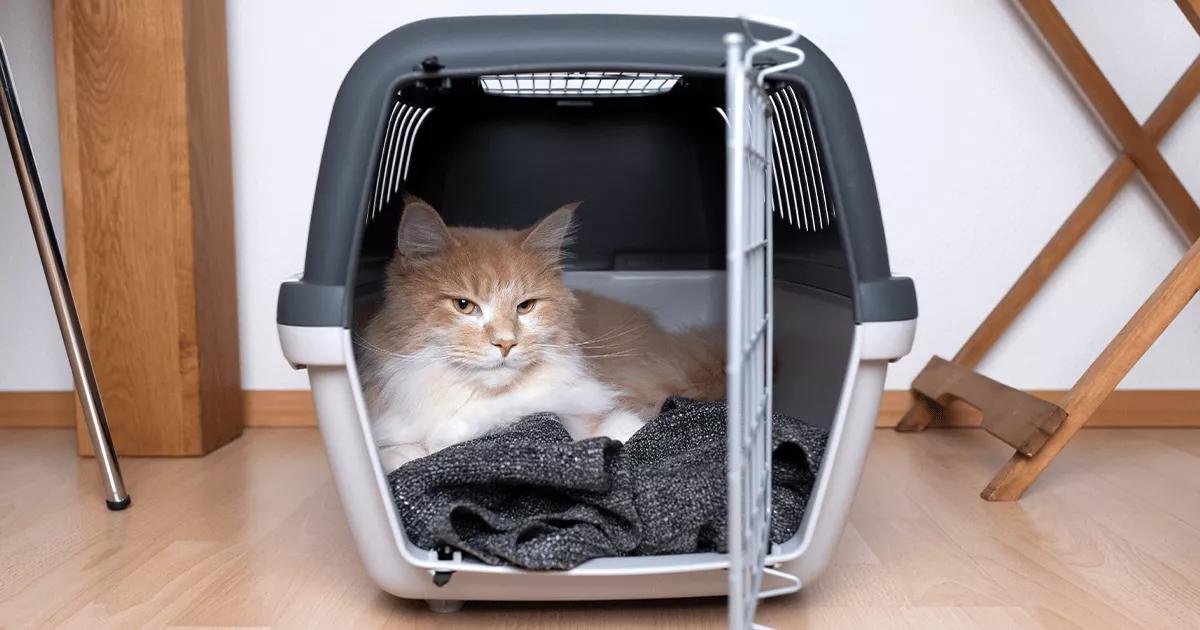
3. Short breaks with your cat
Cats are normally home-loving creatures, but there may be occasions when you would like your cat to accompany you on a short break.
For this, preparation is key:
- If you are going to a pet-friendly hotel or self-catering accommodation, always check in advance what provisions they have in place for your cat.
- Choose the right cat carrier.
- Make sure your cat is relaxed and comfortable using the cat carrier.
- Have everything on hand to keep your cat calm while travelling, including FELIWAY Classic spray, which you can use in the car 15 minutes before travelling.
- Make sure you take their favourite food, bowls, bed and litter trays with you (with their normal substrate), along with their favourite toys to play with.
- If staying in a hotel, make sure that all escape routes are blocked from your hotel room and that room service is aware, so that they do not enter the room and inadvertently let your cat out.
- Use FELIWAY Help! in your accommodation to provide support for your cat and relieve stress.
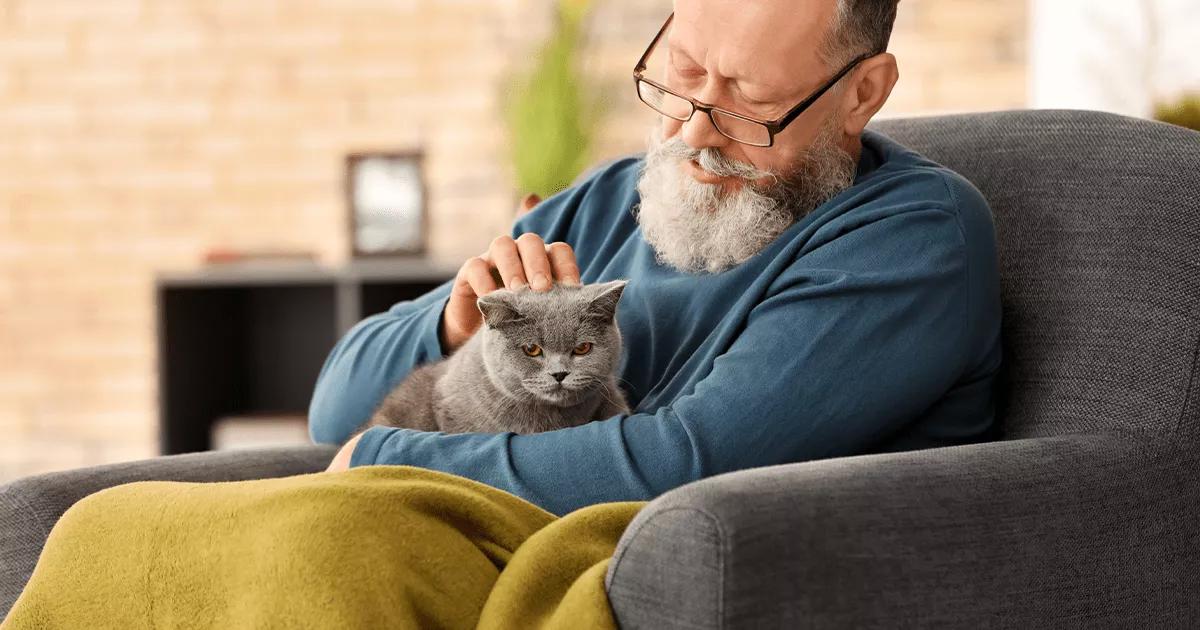
4. Visitors
Are you planning to have house guests for the weekend, or friends coming over for dinner?
Not all cats welcome visitors to their home, so it might be wise to plan ahead to ensure that your kitty’s routine does not get disrupted. This will leave you free to give a warm welcome to your visitors.
- Make sure your cat has access to their safe space. This may be in the corner of a room, or on a high-up spot.
- Plug FELIWAY Help! into a room where your cat can relax while you have visitors. This should be a ‘normal’ space for them – somewhere they are used to.
- Make sure they have their resources handy – a water bowl, food, litter tray and a comfy place to sleep.
- If they are an outdoor cat, allow them access to their exit route if they want it.
- Should your cat want to investigate further, ask your guests to allow the cat to approach them – and not to try and pick them up.
- Keep an eye on your cat’s body language at all times and be prepared to remove them from any situation that may be making them feel uncomfortable.
5. Celebrations
Have you noticed that your cat disappears when you have a party or celebration? Cat’s don’t cope well with disruption to their daily routine – whether that’s different sounds, loud music, new smells or even unpredictable laughter. These can all make your cat feel anxious.
To help your cat cope with temporary changes such as a gathering, make sure they always have access to their favourite safe places while your party is in full swing. They should have everything they would normally need, like food, water, litter trays, toys/activity feeder and FELIWAY Help!
Put a ‘Do Not Disturb’ sign on the door, so that your guests know not to enter that room. You could also play some calming music for your cat in their own space.
Your cat should be allowed to choose whether they interact with your guests or not. If they do want to, help your party guests to understand how to interact with your cat. For example, your guests should allow your cat to come to them (ideally while they are sat on the floor). They can then let your cat sniff their outstretched hand and, if kitty wants to stay, stroke them on the head/neck – but don’t try to pick them up!
If your cat wants to be part of the action, don’t forget that they like to watch from above, so keep their access to elevated perches available to them.
If you see signs that your cat is becoming unhappy or anxious, support them by moving them to their safe space.
6. Returning home from a vet stay
There may be occasions when your cat needs to recover at home after a vet stay. They may feel a little traumatised after their visit and need some quiet time to recover and readjust to their home environment.
Make sure they have a safe and warm space that has all of their resources handy, and where they can lie undisturbed during their recovery. FELIWAY Help!’s calming feline pheromones will support them during this time, until they are back on their feet and back in their normal routine.
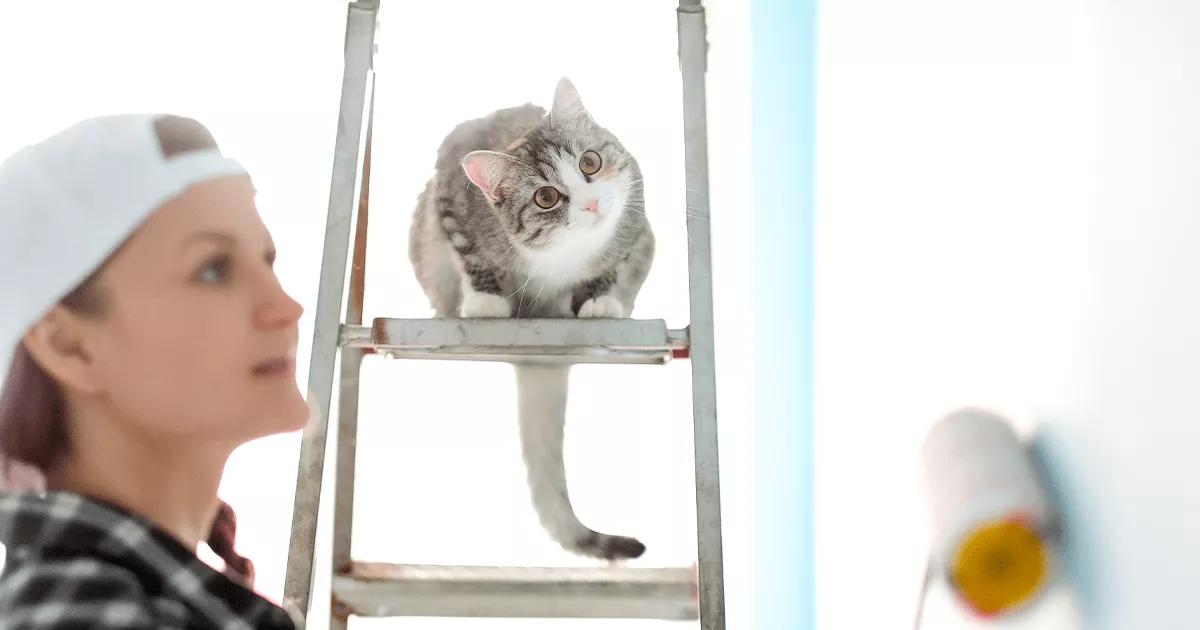
7. Short-term changes at home
They say that a change is as good as a rest – but perhaps your cat won’t agree! Cat’s don’t like change, so if you are planning on painting a room or moving furniture around, take a few steps to help your feline friend adjust.
- Keep your cat to its normal routine (mealtime, playtime etc.).
- Maintain their access to favourite spots, like high perches and cosy corners.
- Make any changes slowly, with small adjustments over time, to give your cat the chance to adjust to each change.













